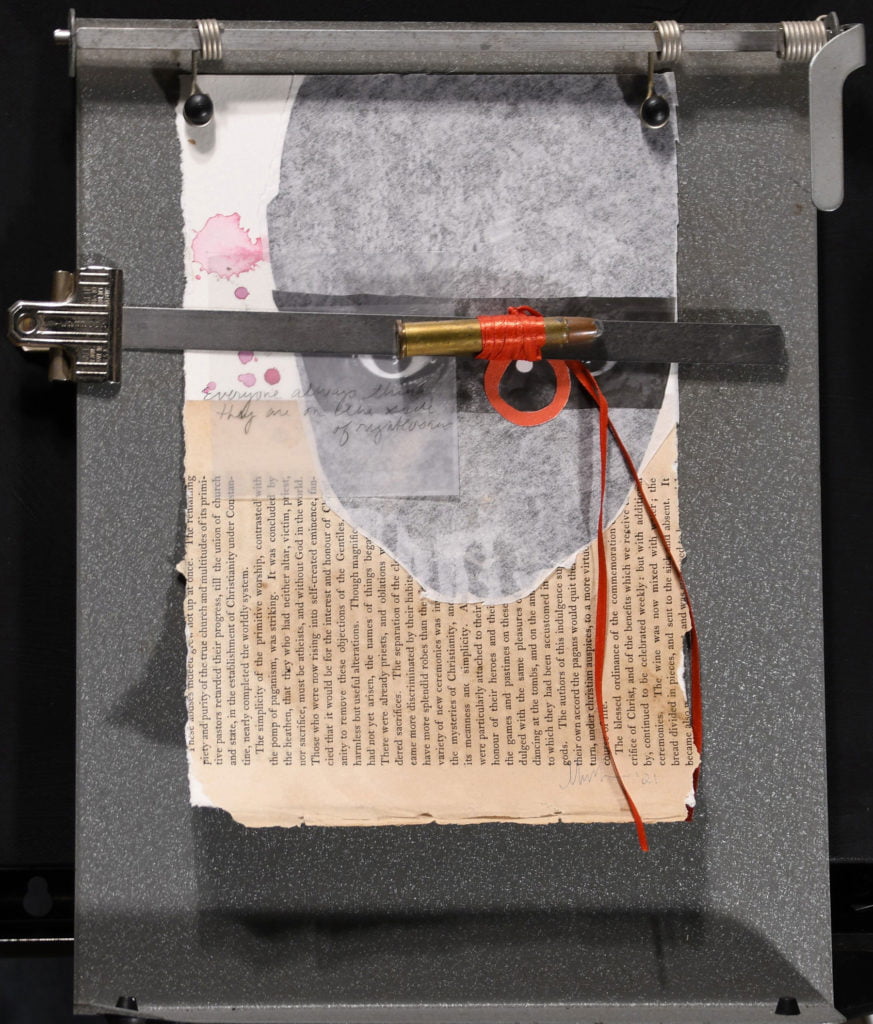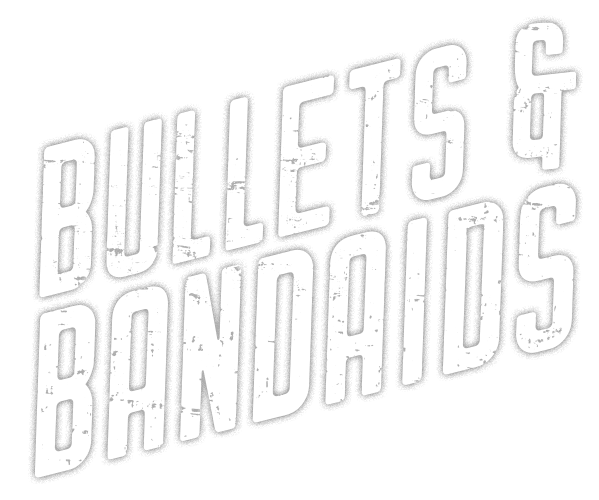
Michaela Pilar Brown
10” x 12” • Paper and Repurposed Objects
My installations, collage and photographs address issues attendant to the black body. I use nontraditional materials and their juxtaposition to each other, and or dissimilar objects to make statements about the body and its relationship to larger cultural themes of age, gender, race, sexuality, history, and violence. Recent studies of Black grief mine personal and familial histories through an archiving of objects and the personal mythologies associated with these objects. I explore the ritualized use of materials, objects, and architectural spaces, often queering their size, orientation or form to blur the line between memory, dream and experience, plotting the relationship between normative considerations of the body and its function within specified spaces and roles.
Inspired by the experiences of an anonymous veteran
We Belong in This Country
by Kristine Hartvigsen
They don’t call it “the draft” in Israel, but all citizens 18 and over — both men and women — are mandated to serve in the Israeli Defense Forces (IDF) immediately after high school. Women serve two years, and men generally do three years.
Military service is an accepted way of life in Israel, and ever since I was a young girl, I longed for the day when I could serve my country. It’s kind of like a rite of passage. I looked forward to joining the army because I felt safe when I was younger, and it was my job now to give back to the soldiers who defended me. They are civilians now, so this is my time to do something for them and the country. I was excited to know that this was my time.
People who are not from here, in my opinion, cannot understand the conflict in our country. Some might see our immediate territorial conflict as purely religious, as Arabs against Jews and vice versa, since our independence from Britain back in 1947. It is more complicated than that. We have Arabs living in Israel who are Israeli citizens. They are about 20% of Israel’s population. Some of them identify as Arab or Palestinian despite their citizenship. Therefore, the government does not require them to serve in the IDF, but it does not forbid it either. Arab Israelis are allowed to join the army. So there are a few Arabs in the IDF, both Christian and Muslim, but it is their choice. Additionally, there are also Druze and also Bedouins serving in the military.
There are army service exemptions for other reasons such as religion and physical or psychological issues. Even my mother, who was religious, didn’t join the army. She opted for national service instead.
I believe everyone in every country should serve at least one or two years in service to their country. That is my opinion. Why? Because we live in this country. This country makes us safe. We belong to this country. I really feel that connection.
Military service in Israel is highly respected, and every year we have a special day when we memorialize soldiers killed in the field or in battles defending us. This year I took part in a program where, twice a week, we visited children in families who have lost a brother or sister killed in the army. It means a lot. And it’s really touching to see how families keep the bedroom of the deceased brother or sister exactly as it was. Their room is still there even though they aren’t.
In these very houses with the empty bedrooms frozen in time, those teenagers received a letter from the army. The first one comes at age 17, it is called the first calling. On this day there are interviews , tests on the computer, and some medical tests. You need to be prepared for questions like “What do you want in the army?” or “Do you want to do combat? Maybe intelligence?” After that day the army sends you letters about what they think you can do and invites you to more interviews. When the army finds you a job, you get the final letter of induction order.
My brother was already a combat soldier, so I asked him about being a combat soldier. He did not recommend it for me or for women in general because of all the physical demands and running. He said that my service will be full of guarding cities and that combat for women is different than for men in many ways. He thought I could do something that would work better for me. So I said no to combat and yes to intelligence, because I am very interested in it. I wanted to do something that I might not be able to do when I was back in civilian life.
Going into the army, I expected to meet people like me, with similar opinions and values. Would I make friends? For some of the people, this was their first time away from home. Everyone was away from their comfort zone, their city, everything familiar. I found that many of those I served with didn’t match my perspective or my attitude. Some acted like they didn’t want to be there or like they were in a bad mood. I had a really hard time. I did not have fun with these people in the army, so my experience was not as good as I wanted. I felt like I was stuck with these people for my entire two-years of service. This is what I got, and I needed to handle it.
So I didn’t like the people I was serving with, and that is OK. I don’t have to like everyone. Military service really depends on people working together. They needed me, and I needed them to do my job. If you don’t connect, you don’t have a good result. I had to transform quickly from a teenager into an adult. I was looking to become more mature, and this experience made me do the switch in my head. Growing up made me more ready for life.
I took the stance that we are here to do something bigger than just to laugh and be friends. I needed to grow up and do my duty, not to have fun. We needed to cooperate with one another to do things for the country.
My commander was just one year older than me. It’s hard when your commander is not much older than you, and there may be cases when they are even younger than you. It makes you think: she doesn’t know enough, and I know better. There were a few times I felt like this.
Sometimes the commanders operated by the book and didn’t think out of the box because of the system. As a soldier you can protest and make a change, but sometimes you just need to go on and understand that you cannot change the world’s orders. I had some issues with my commander. Sometimes I succeeded in changing her mind and sometimes not.
When I finished my army service, we had a little ceremony with the entire team. My commander took me aside and told me that she recognized that I didn’t get to do all the things I wanted to do in the army. And I didn’t get to do things the way I wanted to do them. She said she knew it and really appreciated my attitude, that I didn’t give up. She was sorry that she couldn’t let me do the things that I wanted, but she was really proud of me. She knew those things were important to me and that I was upset. She kind of was there for me though I didn’t think all the time that she was. It touched me.
I saw stories on Israeli TV about people having problems after their army service. “When Heroes Fly” is an example of a TV show about four former IDF veterans who served together in a war. One of them gets PTSD and it is very interesting to see how he copes with it. My experience was pretty standard; I was not traumatized. I understand that some combat soldiers can get PTSD. Fortunately, it didn’t happen to my brother. We were grateful for that. He is fine. I really hope it doesn’t pop up years from now, like some who get it 10 or more years after their service.
In my opinion, every country needs an army to defend the civilians and make them feel safe in their country. Everyone wants to live without fear. They want to walk freely in the street and feel safe in their own country. There are some Arabs and Palestinians that don’t want us here. Some of them want the place, the land, to themselves. Throughout history there were conflicts between Jews and Arabs.
As a civilian now, I just want peace. I don’t want to go on the street and be afraid that something bad will happen. A lot of us, a lot of Israelis, just want peace. But as long as there will not be agreement about the land, there will not be a real peace here and the conflict will continue.
All these years of persecution of Jews and of the conflict, I think, has made Israelis stronger. Of course, there are a lot of tragedies and bad stories and families that are broken from loss. When you fight, it means you are still alive. The Israelis are still alive. We are still here, and we have an army to defend us. So I think it makes us stronger.
I feel pride when I say I’m Israeli. This is who I am. This is where I was born. This is where I live. This is the country where I served in the army. And this is my history. I still want peace. I think a lot of people in Israel want peace.
